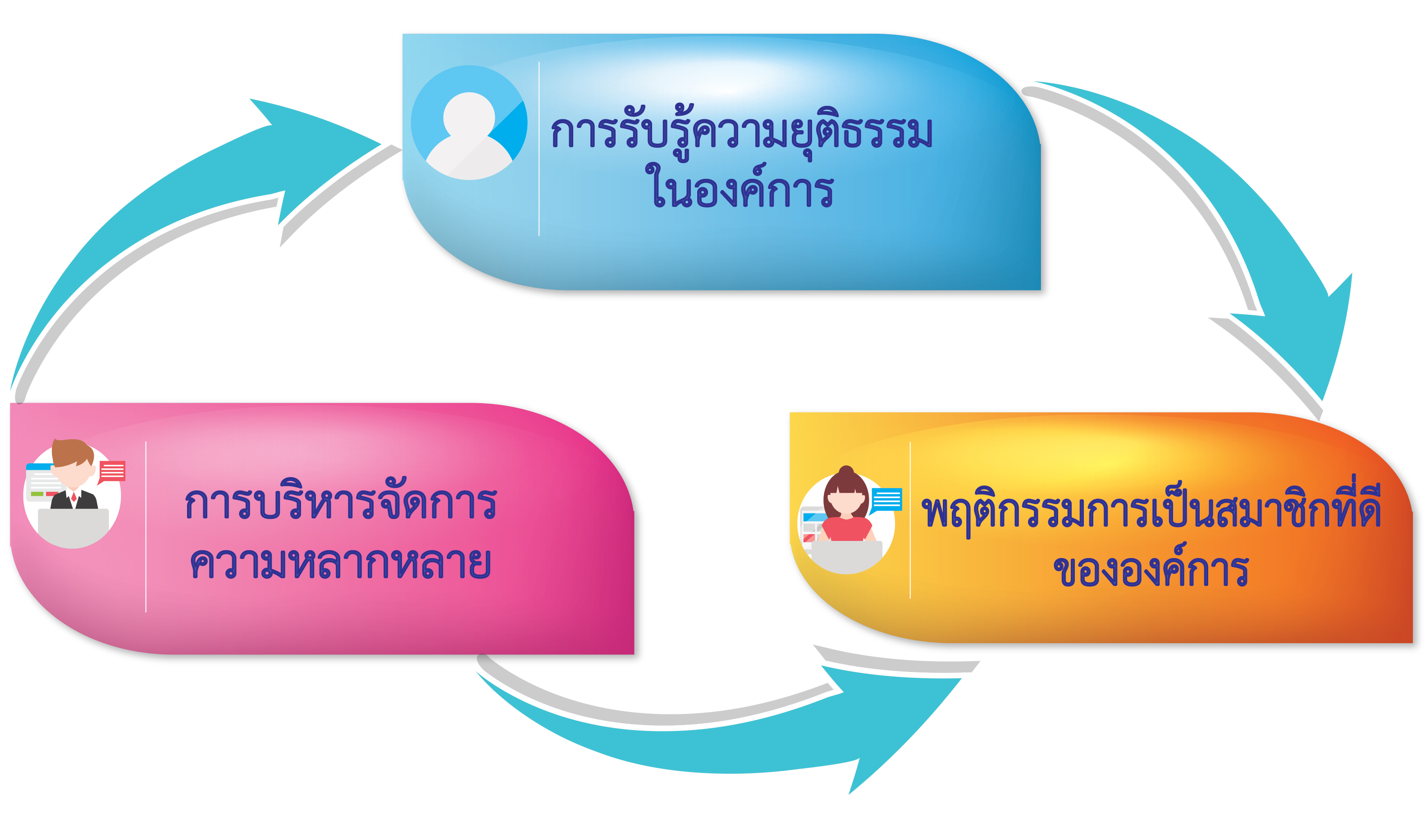The Relationship Between Diversity Management and Organizational Citizenship Behavior Among State Enterprise Employees in the Public Utilities Branch: The Mediating Role of Perceived Organizational Justice
Keywords:
Diversity Management, Perceived Organizational Justice, Organizational Citizenship BehaviorAbstract
This research aims to: 1) study the level of diversity management, perceived organizational justice, and organizational citizenship behavior; 2) study the relationship between diversity management, perceived organizational justice, and organizational citizenship behavior; and 3) study the mediating role of perceived organizational justice on the relationship between diversity management and organizational citizenship behavior among state enterprise employees in the public utilities sector. The quantitative research sample comprised 407 employees from state enterprises in the public utilities sector. The research tools used included a questionnaire on organizational citizenship behavior, perceived organizational justice, and diversity management. The reliability coefficients were .89, .95, and .92, respectively. The statistics used to analyze the data were mean, standard deviation, Pearson's correlation, and multiple regression analysis, using PROCESS macro Model 4.
The results of this study show that:
1. The levels of diversity management ( = 27, S.D. = 0.70), perceived organizational justice (
= 6.07,S.D. = 0.70), and organizational citizenship behavior (
= 6.14, S.D. = 0.54) are, on average, very high.
2. Diversity management is positively related to organizational citizenship behavior and perceived organizational justice at a statistically significant level of 0.01, with a regression coefficient of 0.379. while perceived organizational justice is positively related to organizational citizenship behavior at a statistically significant level of 0.01, with regression coefficients of 0.658 and 0.456.
3. Perceived organizational justice partially mediates the relationship between diversity management and organizational citizenship behavior at a statistically significant level of 0.01.
References
เกษราภรณ์ กุณรักษ์ และทิพทินนา สมุทรานนท์. (2561). ความสัมพันธ์ระหว่างการรับรู้ความยุติธรรมขององค์การ การมอบอำนาจในงานเชิงจิตวิทยาและพฤติกรรมการเป็นสมาชิกที่ดีขององค์การของข้าราชการในหน่วยงานราชการแห่งหนึ่ง. วารสาร HR intelligence, 2(2), 34-53.
วราพร เจริญสมบูรณ์นิธิ. (2560). อิทธิพลของการรับรู้ความยุติธรรมในองค์การ การรับรู้บรรยากาศขององค์การและพฤติกรรมการเป็นสมาชิกที่ดีขององค์การ โดยมีคุณภาพชีวิตการทำงานเป็นตัวแปรสื่อ. วารสารวิจัยและพัฒนา มหาวิทยาลัยราชภัฏสวนสุนันทา, 9(1), 158-167.
สำนักงบประมาณของรัฐสภา. (2563). รัฐวิสาหกิจไทยแหล่งรายได้รัฐบาลหรือภาระงบประมาณของแผ่นดิน สำนักงานเลขาธิการสภาผู้แทนราษฎร. เข้าถึงได้จาก https://www.parliament.go.th/ewtadmin/ewt/parbudget/ewt_dl_link.php?nid=855
Adams, J. S., & Freedman, S. (1976). Equity theory revisited: Comments and annotated bibliography. Advances in Experimental Social Psychology, 9, 43-90.
Adecco Thailand. (2020). ทำไม Diversity ถึงสำคัญกับองค์กร. เข้าถึงได้จาก https://knowledge-center/detail/hr-insight/why-diversity-is-important-in-the-workplace
Bizri, R. (2018). Diversity management and OCB: The connection evidence from the Lebanese banking sector. Equality, Diversity and Inclusion: An International Journal, 37(3), 233-253.
Blouch, R., & Azeem, M. F. (2019). Effects of perceived diversity on perceived organizational performance: Mediating role of perceived organizational justice. Employee Relations: The International Journal, 41(5), 1079-1097.
Brimhall, K. C., Lizano, E. L., & Barak, M. E. M. (2014). The mediating role of inclusion: A longitudinal study of the effects of leader–member exchange and diversity climate on job satisfaction and intention to leave among child welfare workers. Children and Youth Services Review, 40, 79-88.
Cheng, S. Y. (2014). The mediating role of organizational justice on the relationship between administrative performance appraisal practices and organizational commitment. The International Journal of Human Resource Management, 25(8), 1131-1148.
Choi, S., & Rainey, H. G. (2014). Organizational fairness and diversity management in public organizations: Does fairness matter in managing diversity?. Review of Public Personnel Administration, 34(4), 307-331.
Cropanzano, R., & Greenberg, J. (1997). Progress in organizational justice: Tunneling through the maze. International Review of Industrial and Organizational Psychology, 12, 317-372.
Dixon-Fyle, S., Dolan, K., Hunt, V., & Prince, S. (2020). Diversity wins: How inclusion matters. McKinsey & Company report.
Greenberg, J., & Colquitt, J. A. (2005). Handbook of organizational justice. Psychology Press.
Hayes, A. F. (2017). Introduction to mediation, moderation, and conditional process analysis: A regression-based approach. Guilford Publications.
Kim, S., & Park, S. (2016). Organizational justice as an outcome of diversity management for female employees: Evidence from US federal agencies. Transylvanian Review of Administrative Sciences, 12(49), 41-59.
Krejcie, R. V., & Morgan, D. W. (1970). Determining sample size for research activities. Educational and Psychological Measurement, 30(3), 607-610.
Mousa, M., Massoud, H. K., & Ayoubi, R. M. (2020). Gender, diversity management perceptions, workplace happiness and organisational citizenship behaviour. Employee Relations: The International Journal, 42(6), 1249-1269.
Novitasari, D., Riani, A. L., Suyono, J., & Harsono, M. (2021). The moderation role of ethical leadership on organisational justice, professional commitment, and organisational citizenship behaviour among academicians. International Journal of Work Organisation and Emotion, 12(4), 303-324.
Organ, D. W., Podsakoff, P. M., & MacKenzie, S. B. (2005). Organizational citizenship behavior: Its nature, antecedents, and consequences. Sage Publications.
Podsakoff, P. M., MacKenzie, S. B., Moorman, R. H., & Fetter, R. (1990). Transformational leader behaviors and their effects on followers' trust in leader, satisfaction, and organizational citizenship behaviors. The Leadership Quarterly, 1(2), 107-142.
Preacher, K. J., Rucker, D. D., & Hayes, A. F. (2007). Addressing moderated mediation hypotheses: Theory, methods, and prescriptions. Multivariate Behavioral Research, 42(1), 185-227.
Singh, A., & Banerji, R. (2022). Happiness at work, organization citizenship behaviour and workplace diversity: a study on Indian private sector bank employees. Industrial and Commercial Training, 54(3), 460-475.
Tajfel, H. (1982). Social identity and intergroup relations. Cambridge University Press.
Tsui, A. S., Egan, T. D., & O'Reilly III, C. A. (1992). Being different: Relational demography and organizational attachment. Administrative Science Quarterly, 37(4), 549-579.






